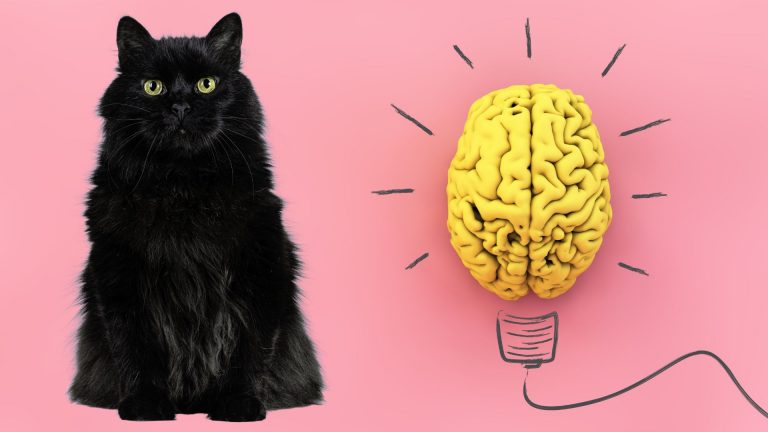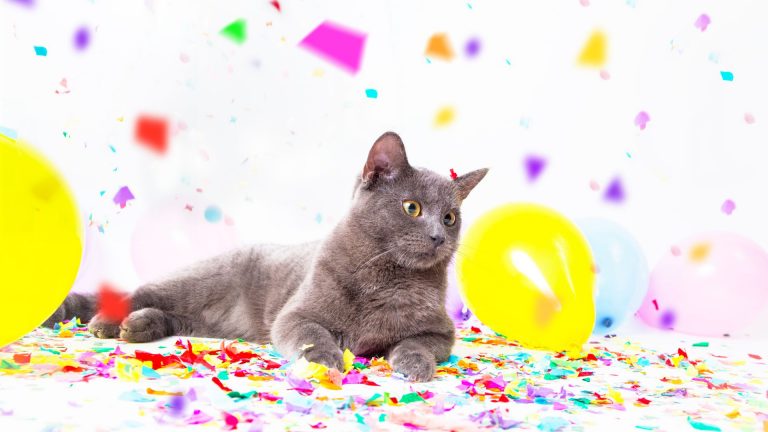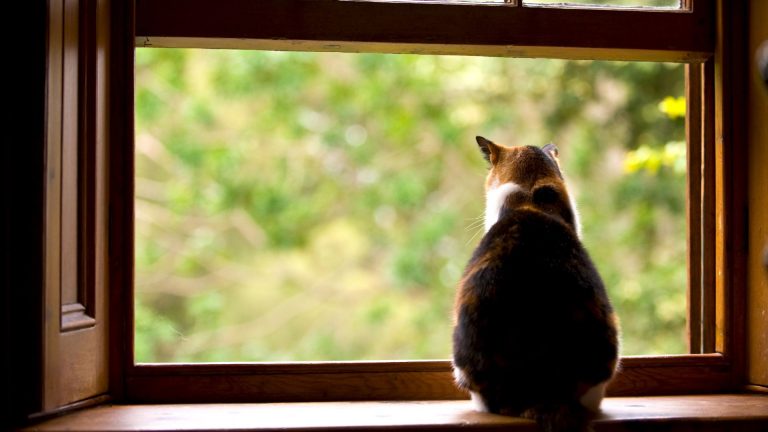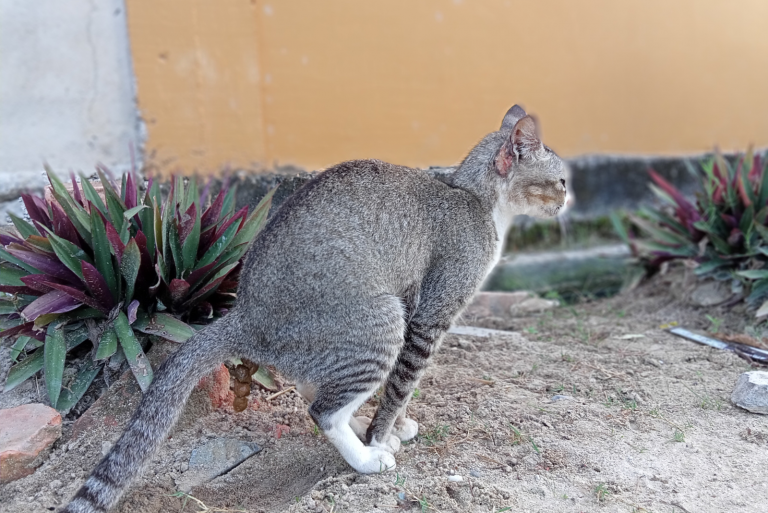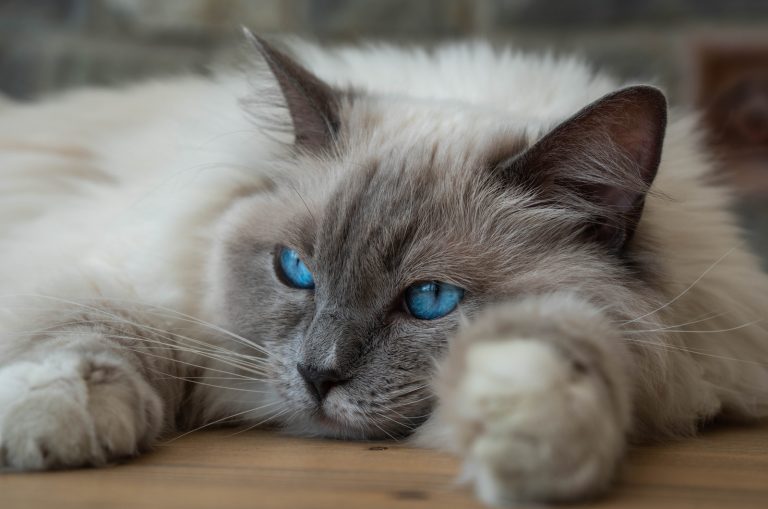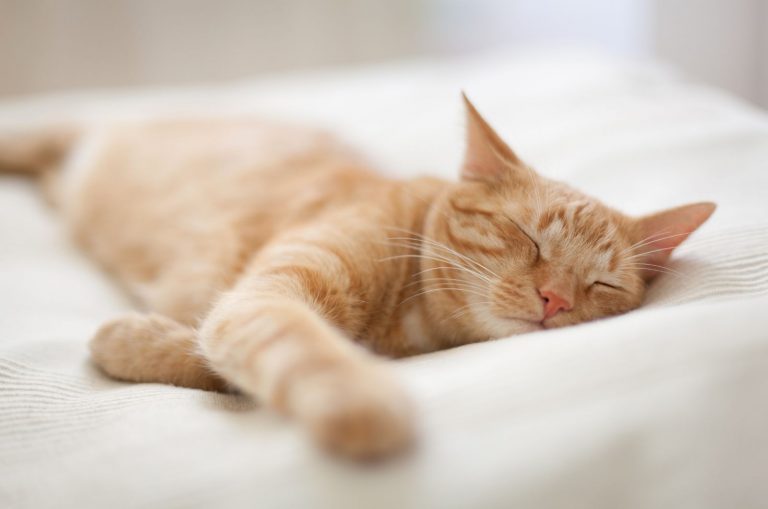Are Sunflowers Toxic To Cats? Learn The “Safe Flowers” List
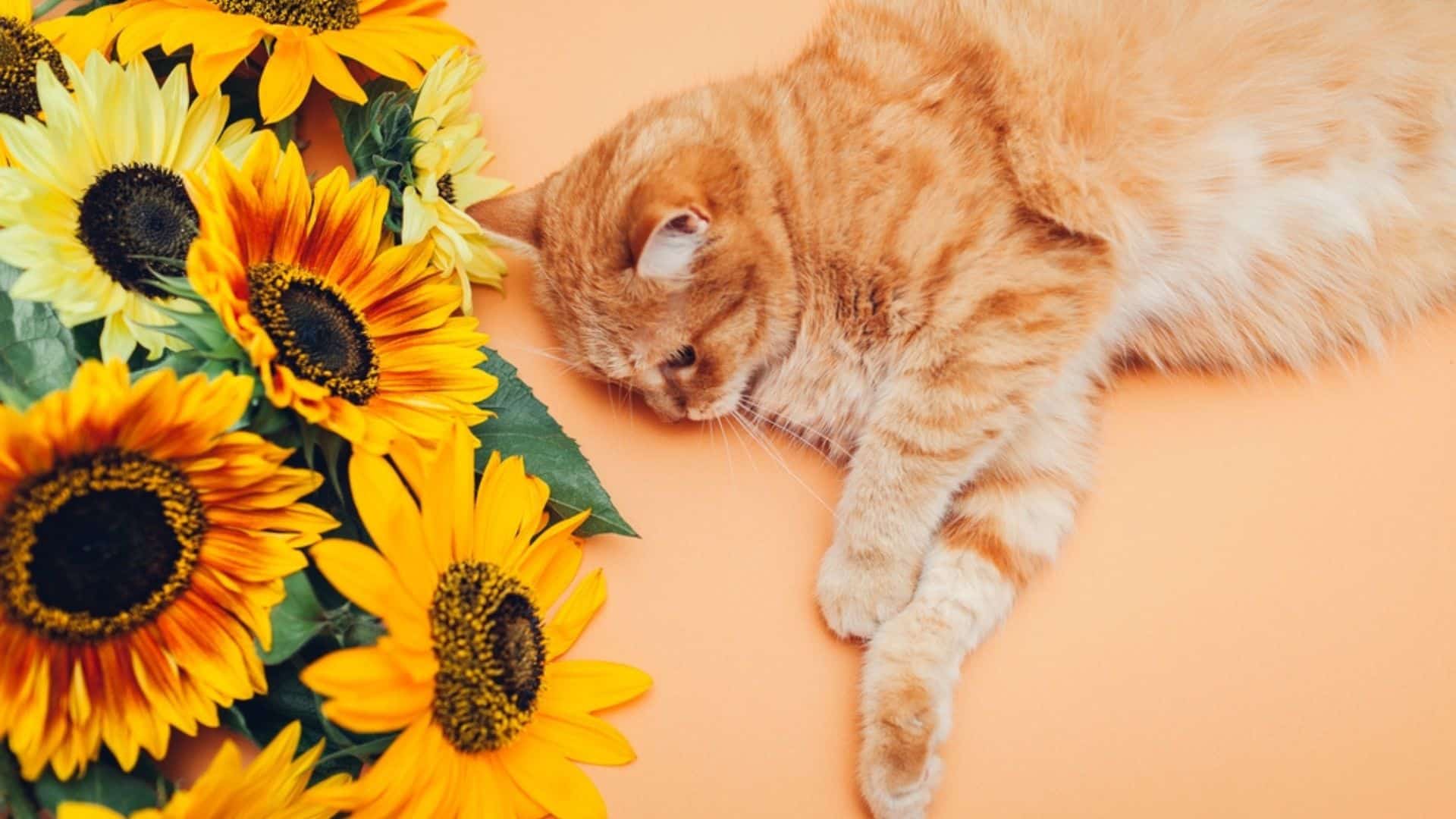
Due to their remarkable sun-like appearance and lovely yellow petals, sunflowers are very well-liked by most people, especially in the summer. Sunflowers are the only flowers that immediately brighten up anyone’s day!
If you’re a sunflower-lover and like to see these eye-catching flowers growing in your garden or displayed in a vase in your home, you might wonder: Are sunflowers toxic to cats? Is it safe for me to keep them around my kitty?
I have some good news: sunflowers are not toxic for cats! However, remember that even non-poisonous flowers can irritate a cat’s stomach.
In this article, I will go over whether eating sunflowers is good for cats, if you should give your cat sunflower seeds or oil, what other cat-safe plants there are, and which plants you need to keep your cat away from.
Are Sunflowers Toxic To Cats?
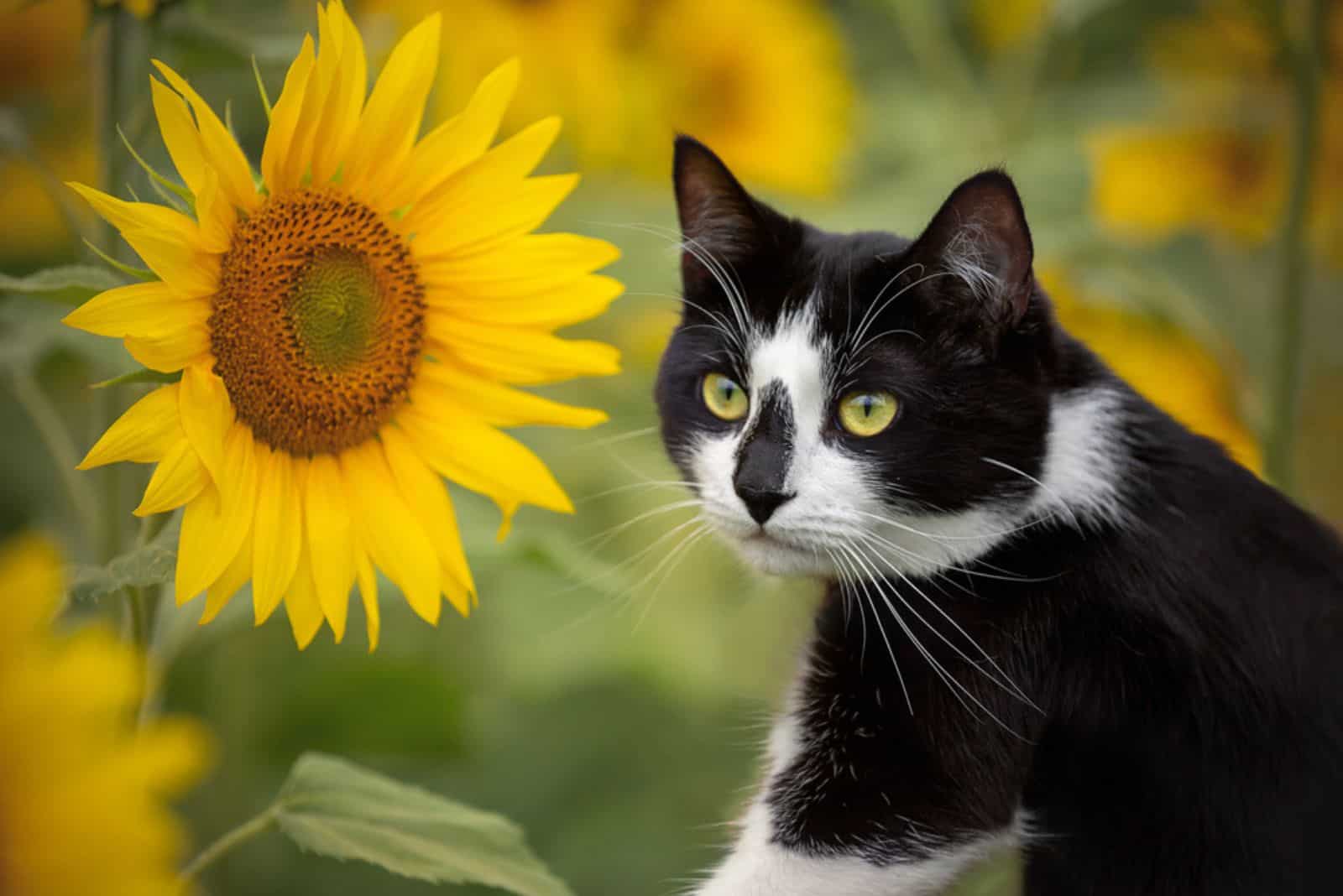
Sunflowers comprise a genus of about 70 species known as Helianthus. You’re most likely familiar with the sunflower species Helianthus annuus, known as the common sunflower.
However, not all sunflowers have big yellow petals! From cream to gold, yellow, orange, red, mahogany, and chocolate brown, sunflowers come in various hues!
While witnessing your cat nibbling on a small piece of a sunflower might make you concerned, I assure you – there is no need to panic, as sunflowers are not toxic for cats!
Some felines like nibbling on plants, as they provide extra fiber and nutrients. Plants help cats move furballs through their digestive system!
However, even non-toxic plants can cause an upset stomach if eaten in large quantities, which I will write about a bit further below!
What Does ASPCA Have To Say About Sunflowers?
American Society for the Prevention of Cruelty to Animals (ASPCA) is a great source of information regarding the safety and toxicity of plants.
So, what does ASPCA have to say about sunflowers? According to them, sunflowers are non-toxic for cats and are not likely to cause anything other than a mild gastrointestinal upset if ingested.
The ASPCA also adds that sunflowers are non-toxic for dogs as well!
I advise cat owners to check their website whenever they’re worried about their cat ingesting some plant, as they’re a valuable source of information.
Safety Of Sunflower Petals, Leaves, Seeds, And Oils
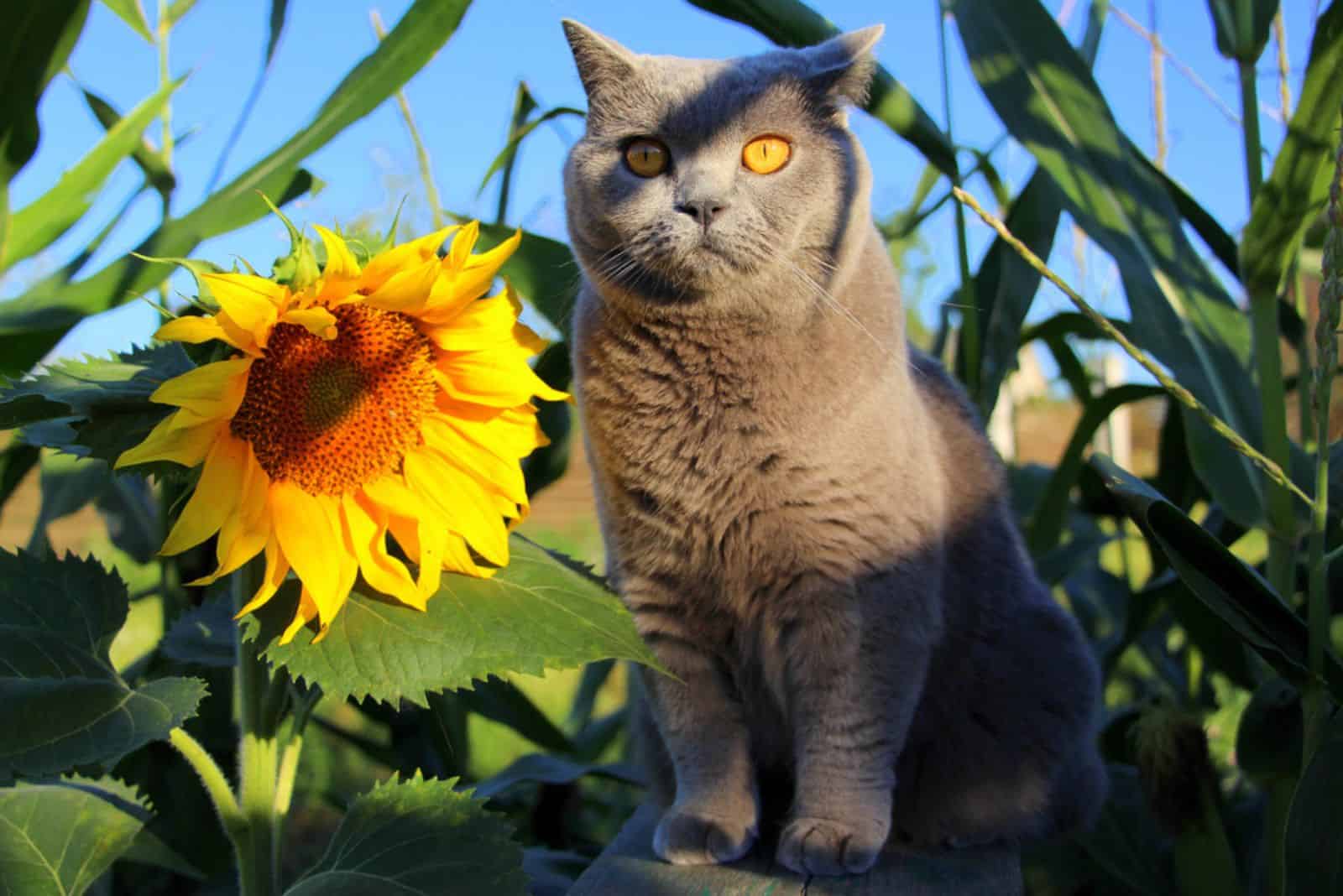
The common sunflower is a large annual plant cultivated for its edible oil and seeds.
In addition to being used as food for wild birds and animals, this sunflower is also employed in industrial settings, and as a decorative plant.
Considering your cat is likely to encounter sunflower petals, leaves, seeds, and oil in your garden or kitchen, you might wonder if they’re safe for your cat.
1. Sunflower Petals
Sunflower petals are non-toxic to cats, so yes, cats can eat them.
Despite being primarily carnivores, cats do consume plants for additional nutrients and fibers. It might be odd to see your cats nibbling on plants, considering how much they love meat, but yes, cats do sometimes eat plants!
Some cats, in particular, love the taste, texture, or scent of certain plants and occasionally make them a snack. Therefore, if you see your cat eating sunflower petals, there is no need for concern, as long as it’s not in large amounts.
2. Sunflower Leaves
Cats are naturally curious and like nibbling on plants. While certain plants provide your pet with essential micronutrients, others are harmful or hazardous to cats.
Unlike many indoor and outdoor plants, your cat won’t react negatively to being near, rubbing against, or even taking a tiny nibble of the leaves.
However, your cat can go a bit overboard with munching on sunflower leaves, which can lead to a tummy ache.
Therefore, if you see your cat eating sunflower leaves often or in large quantities, keep them away from sunflowers.
3. Sunflower Seeds
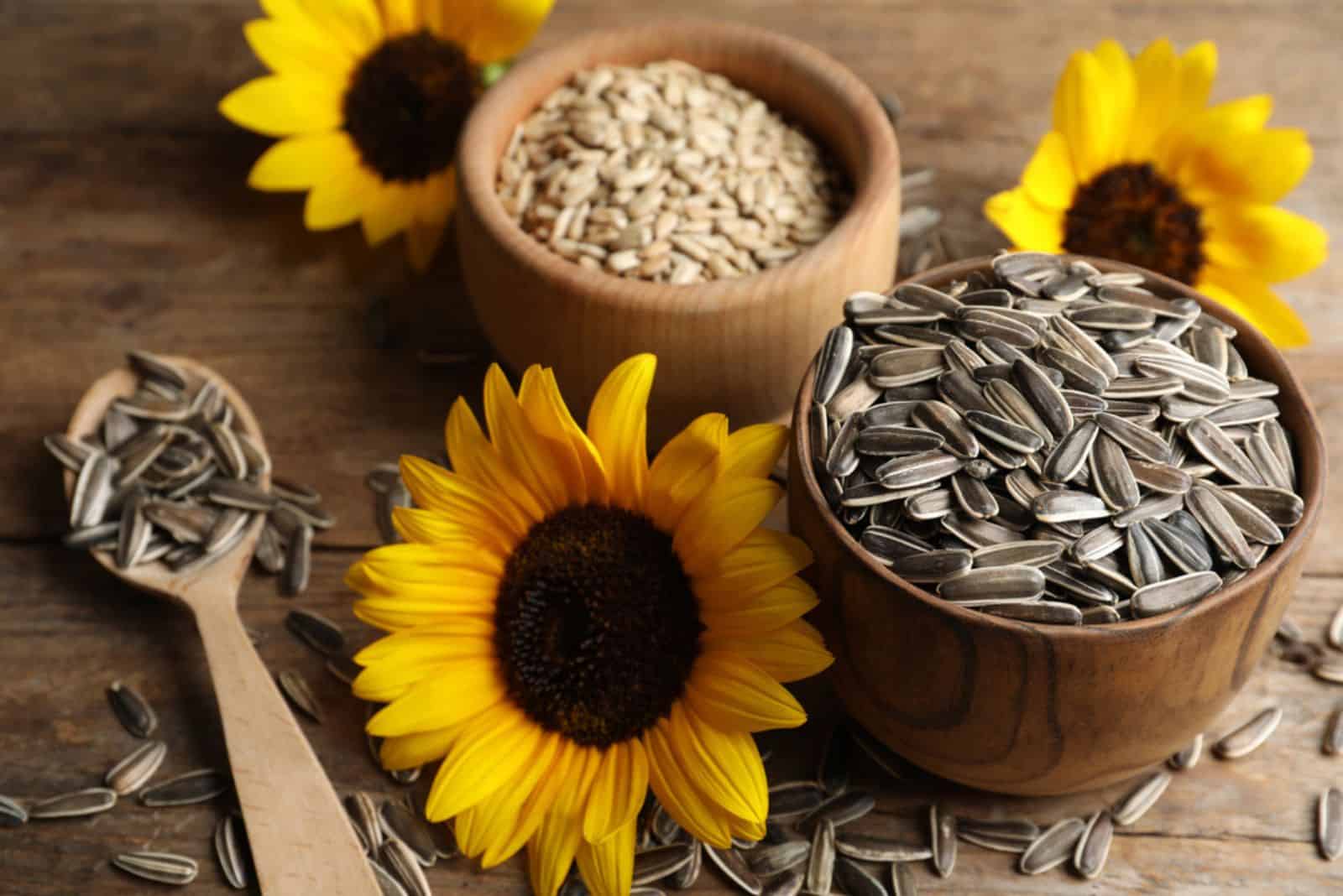
Sunflower seeds are safe for cats if eaten in moderation. You can give them to your cat one or two times a week as an occasional treat, and make sure to provide them with only a few at a time.
One important thing I must mention is that if you do give your cat sunflower seeds, make sure to remove the outer shell. Due to their sharpness, these outer shells are difficult to digest and may even cause digestive pain.
Another potential issue is that sunflower seeds are often salted. As you already might know, cats should stay away from salt. If your cat ingests a lot of salted sunflower seeds, it can experience adverse side effects, such as excessive thirst, vomiting, diarrhea, lethargy, etc.
Therefore, give your cat only unsalted seeds with the outer shell removed.
4. Sunflower Oil
Cats can eat sunflower oil. Because it contains many omega-6 fatty acids, sunflower oil can enhance your cat’s health.
Sunflower oil won’t harm your cat if it is consumed in moderation. However, it’s something you should refrain from regularly offering to your cat, as it’s not a part of their regular diet.
Of course, too much oil also means too much fat, which might make your cat obese, which is definitely something you want to avoid. In the case of sunflower oil, moderation is key!
What Happens If My Cat Eats Sunflowers?
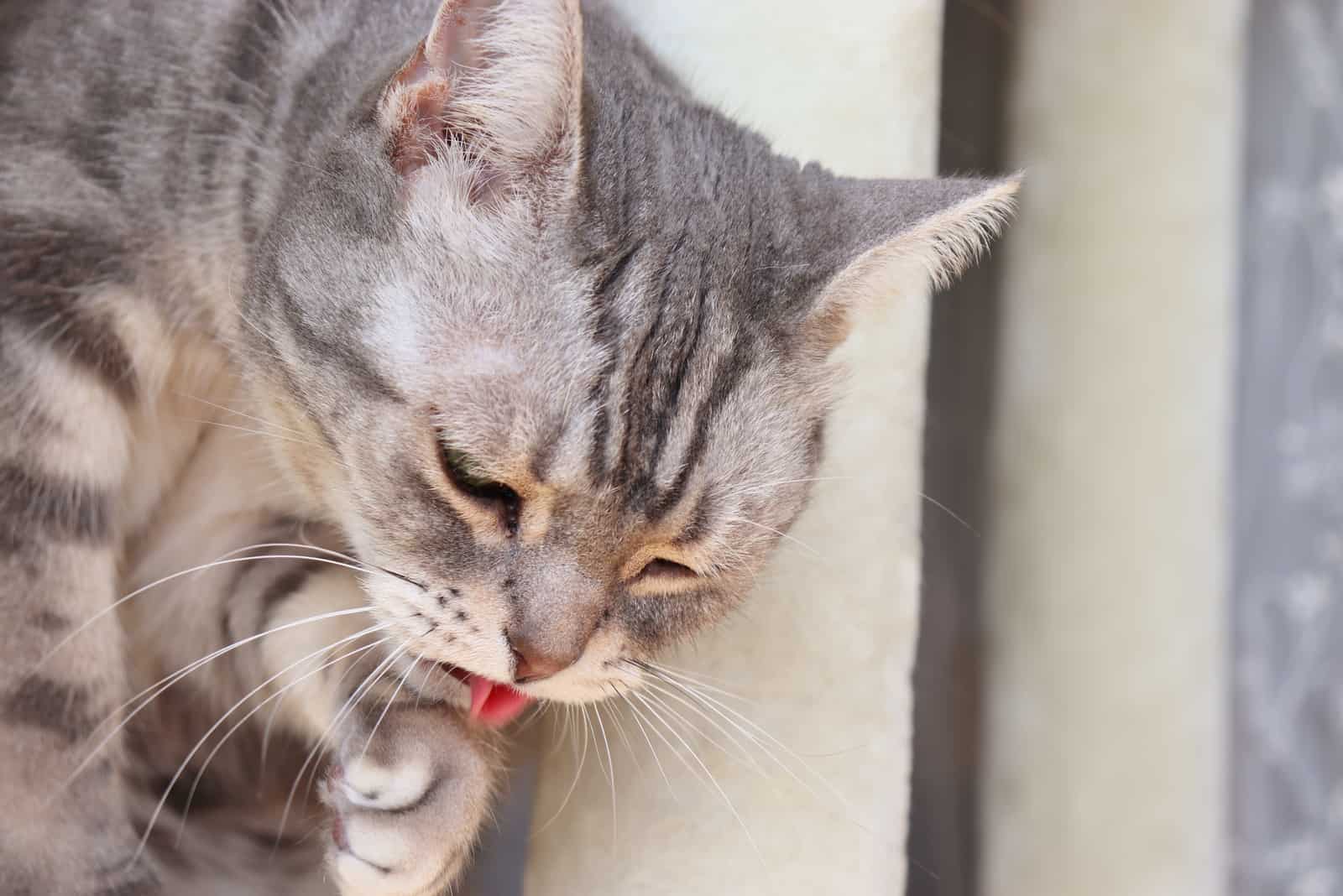
Cats can be very curious, especially when they’re young. Some felines are drawn to flowers because of their flavor or texture. If you observe your kitten or adult cat eating sunflowers, you might wonder what could happen to them?!
If you notice your cat nibbling on sunflowers, rest assured that nothing bad will happen. There are no significant health hazards for a cat munching on sunflowers.
However, if your cat eats a lot of them, it can develop diarrhea, vomiting, or other gastrointestinal issues.
An excessive amount of plant matter in your cat’s diet might cause digestive problems, and of course, the stomach problems will get worse the more sunflowers your cat eats.
It’s not likely that your cat will go overboard while eating sunflowers. I’ve personally never had a cat encounter the negative side effects of eating too many sunflowers, as not many cats enjoy eating sunflowers in the first place.
However, please call your vet or the ASPCA Animal Poison Control Center at (888) 426-4435 if you notice your cat appears to be reacting negatively to ingesting sunflowers, or go to your vet.
Why Is My Cat Eating Sunflowers?
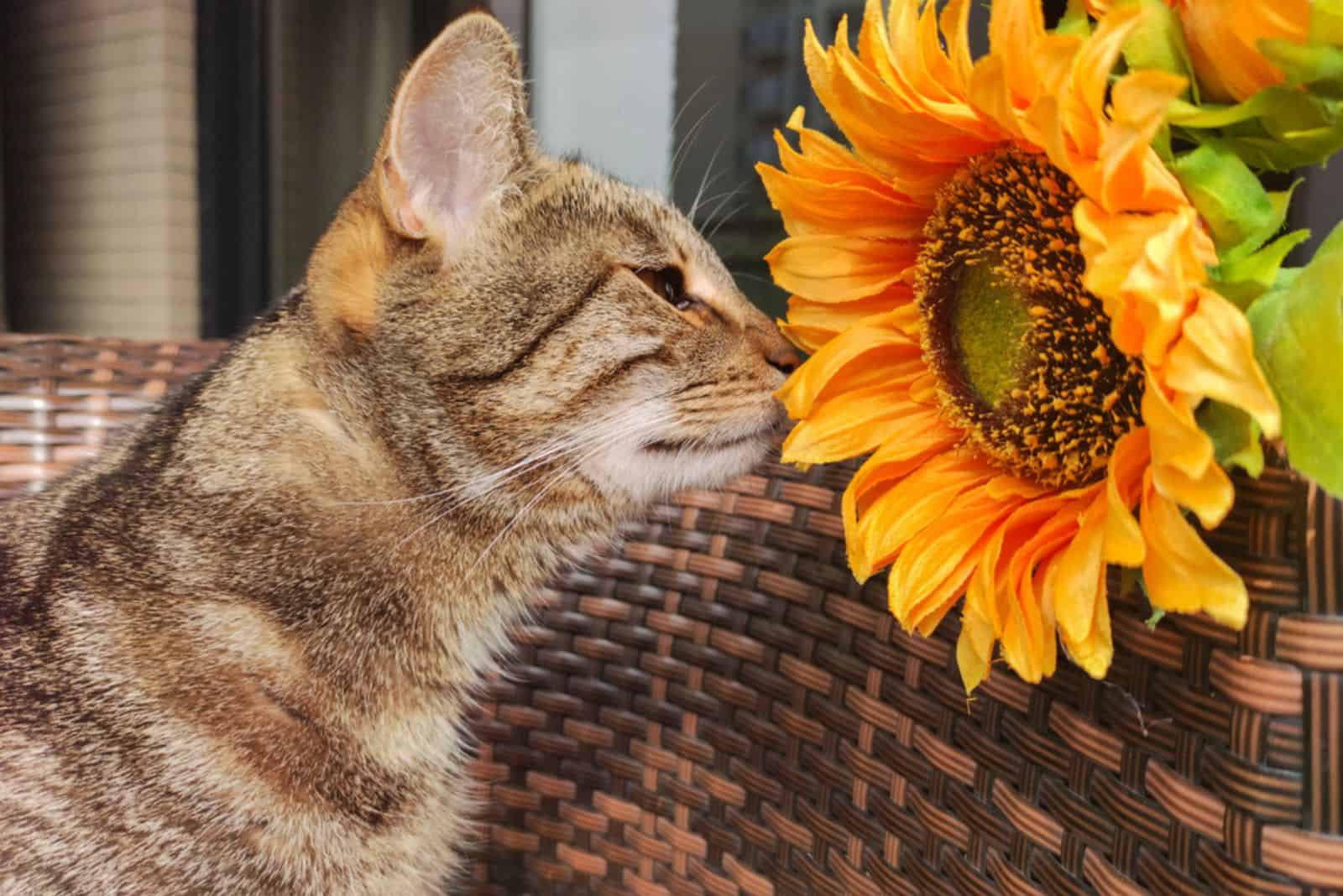
Considering cats are meat lovers, you might be curious why cats would even try eating sunflowers, let alone enjoy munching on them more than once.
There are three main reasons cats eat sunflowers, and all other plants for that matter, and those are:
1. Your Cat Likes The Flavor Or Texture
Given their high protein content, it’s probable that your cat loves the flavor and smell of sunflower seeds if he eats them.
When you take your cat outside, you might see that they are immediately drawn to the grass and start nibbling. They may simply like the plant’s texture!
2. Your Cat Is Lacking Nutrients
If your cat gravitates toward treats like sunflowers and other plants (such as wheatgrass), it may lack a nutrient in its diet and is trying to obtain them this way.
To satisfy your cat’s needs:
• Switch to more nutrient- or fiber-rich foods.
• Ensure that the food your cat consumes meets all its nutritional demands.
• Before making any purchases, check the ingredient list to be sure you’re giving your cat a nutritionally sound diet that will keep them satisfied.
3. Your Cat Is Bored
Cats may eat houseplants in the home out of boredom or because the leaves waving in the breeze catch their attention.
Although it has long been believed that cats require less upkeep than dogs, this is not always the case. Neglecting to keep your cat cognitively and physically active can result in destructive behavior.
Remember that they are attempting to fulfill their natural requirements in our homes. Your plant (along with other objects around the house) can be the target of their boredom if cat owners don’t provide enough physical and mental stimulation.
What Is The Best Way To Keep Cats From Eating Sunflowers?
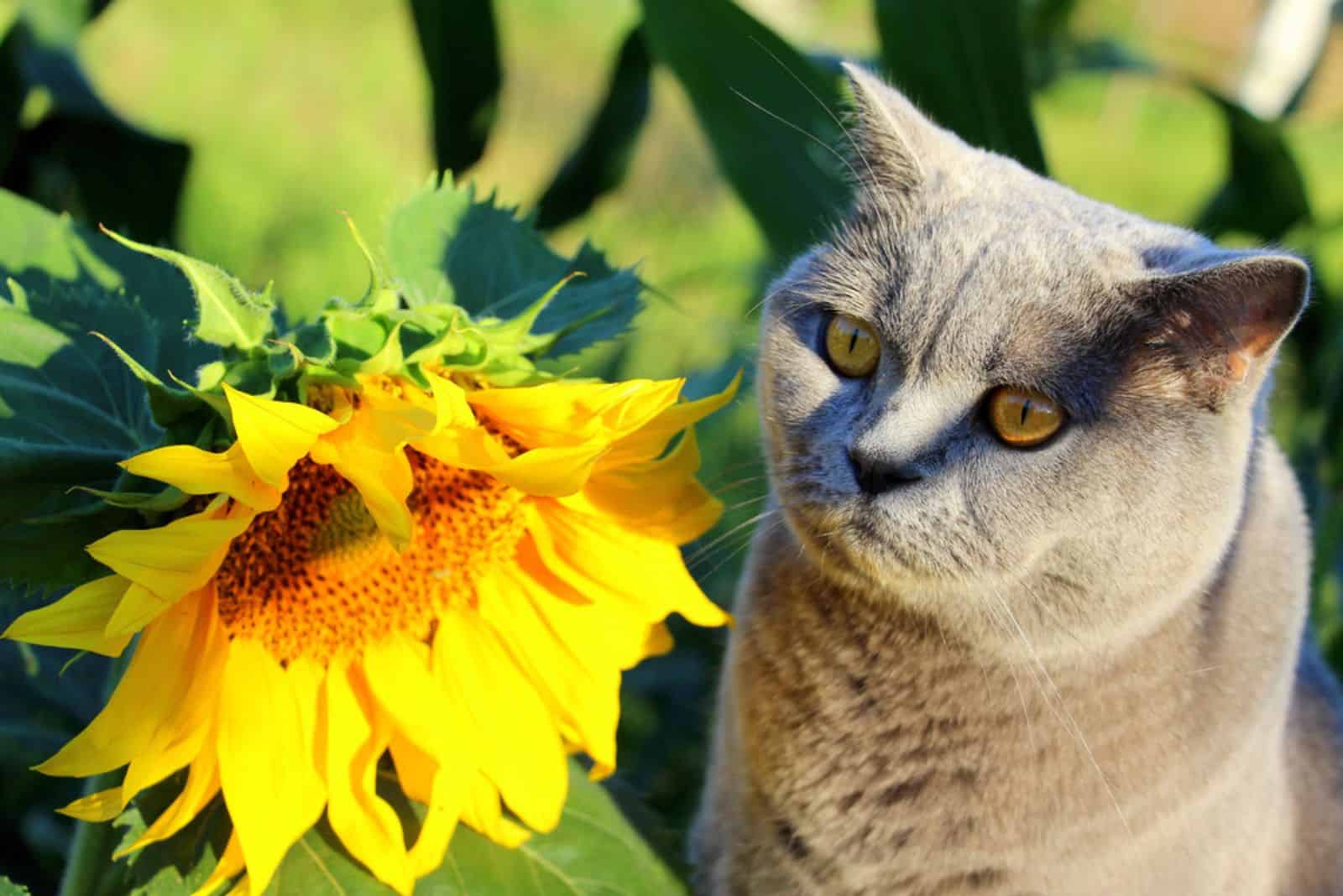
Freshly cut flowers make any space look and smell nicer, and sunflowers are one of the most well loved and popular of flowers. If you enjoy looking at your sunflowers in a vase (and intact!), you might wish to deter your cat from nibbling on them.
If you want your flowers to stay intact growing in your garden and spare your cat a tummy ache, keeping your cat away from sunflowers is a way to ensure both!
So, what is the best way to deter cats from eating sunflowers? Below are a few strategies you can try!
• Spray the sunflowers with citrus spray
Cats strongly dislike anything citrus-flavored or with a citrus smell. To deter any cat invasion, you can spray your plant’s leaves with lemon, lime, or orange juice diluted with water.
• Make the plant unapproachable
You can also put tiny, spiky twigs in the soil around the bases of your sunflowers to discourage your cat from coming near the plant. Small wooden sticks might work as well, or any other material you see fit. The goal is to discourage your cat from getting near the plant in the first place.
• Spray sunflowers with vinegar and water mix
Making a simple vinegar and water spray can solve your troubles. Spray it over your sunflowers or other flowers your cat is nibbling on. The vinegar smell is unpleasant for cats, and most cats are repelled by it. If this doesn’t work, a stronger repellent such as cinnamon or cayenne pepper can be sprinkled on the leaves of your plants.
• Have your garden sunflowers netted
You should consider netting your sunflowers if you have a major problem with your cat eating them frequently. It will make your sunflowers look less gorgeous as they look when they are freely waving, but at least it will protect both your cat and the flowers!
Will It Be Easy?
Cats are notoriously challenging to command. If you’ve ever owned a cat, you’re probably familiar with the look of contempt they give you whenever you ask them to stop doing something.
Therefore, it can be more difficult than you anticipated to keep your headstrong cat away from sunflowers. But, if you’re determined to have sunflowers in your garden or your home as cut flowers, you will surely manage after some time!
What Are Some Other Common Cat-Safe Flowers?
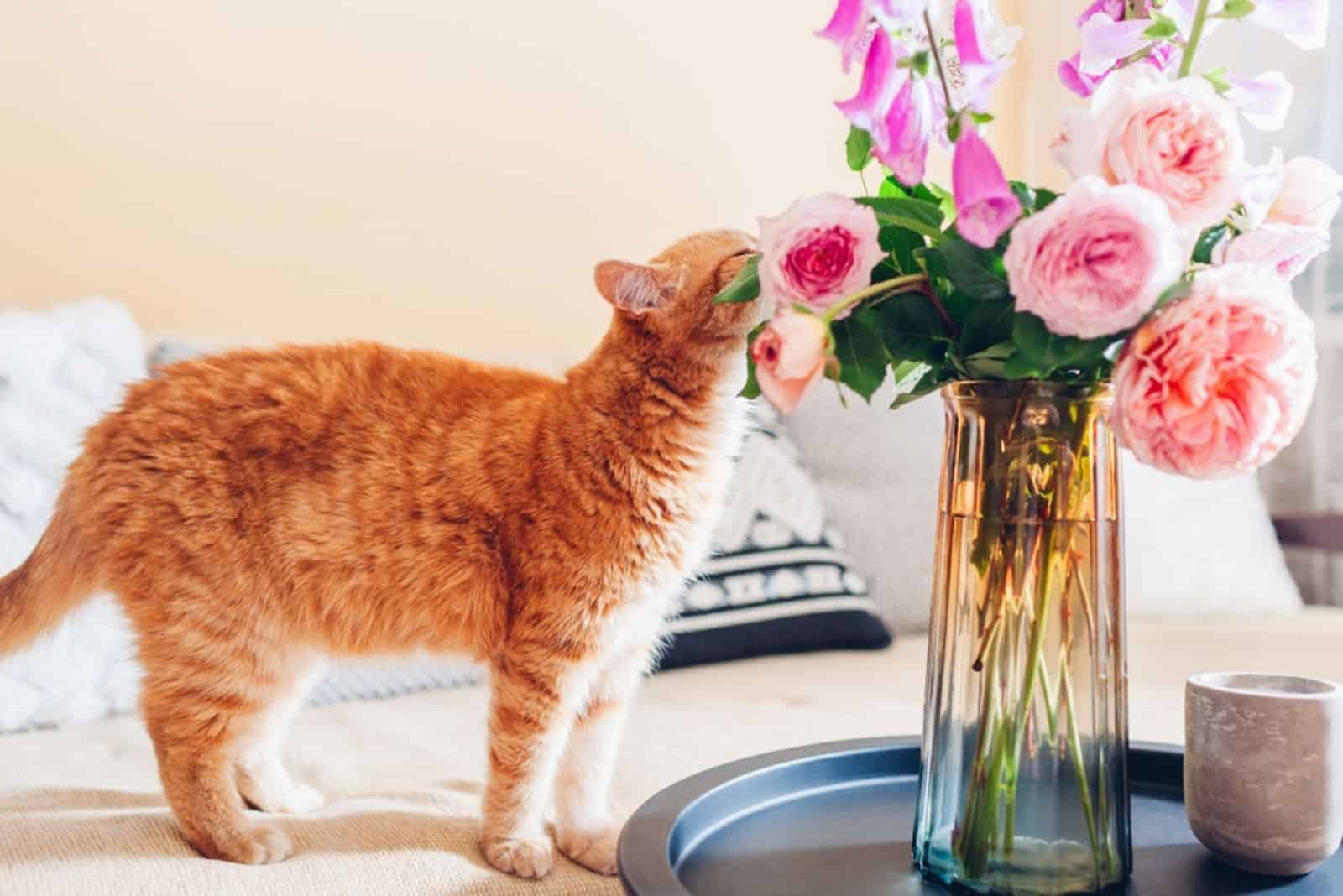
Now that you know sunflowers are safe, you might wonder which other flowers are also cat-safe. Luckily, there are many of them, and the ones you are more likely to have in your yard are:
🐾 Lilacs
🐾 Roses
🐾 Daisies, Gerber Daisies
🐾 Orchids
🐾 Petunias
🐾 Camellias
🐾 Snapdragons
🐾 Peruvian lilies (also known as Alstroemeria)
🐾 Marigolds
🐾 Asters
🐾 Camellia
🐾 Freesia
🐾 Statice
🐾 Stock
🐾 Zinnia
If you’re planning on planting some flowers in your garden, first check if the plant you want to grow is non-toxic for your feline. Many flowers listed above look absolutely gorgeous and are cat-safe, which is the combination you’re looking for!
Which Common Flowers Are Potentially Toxic For Cats?
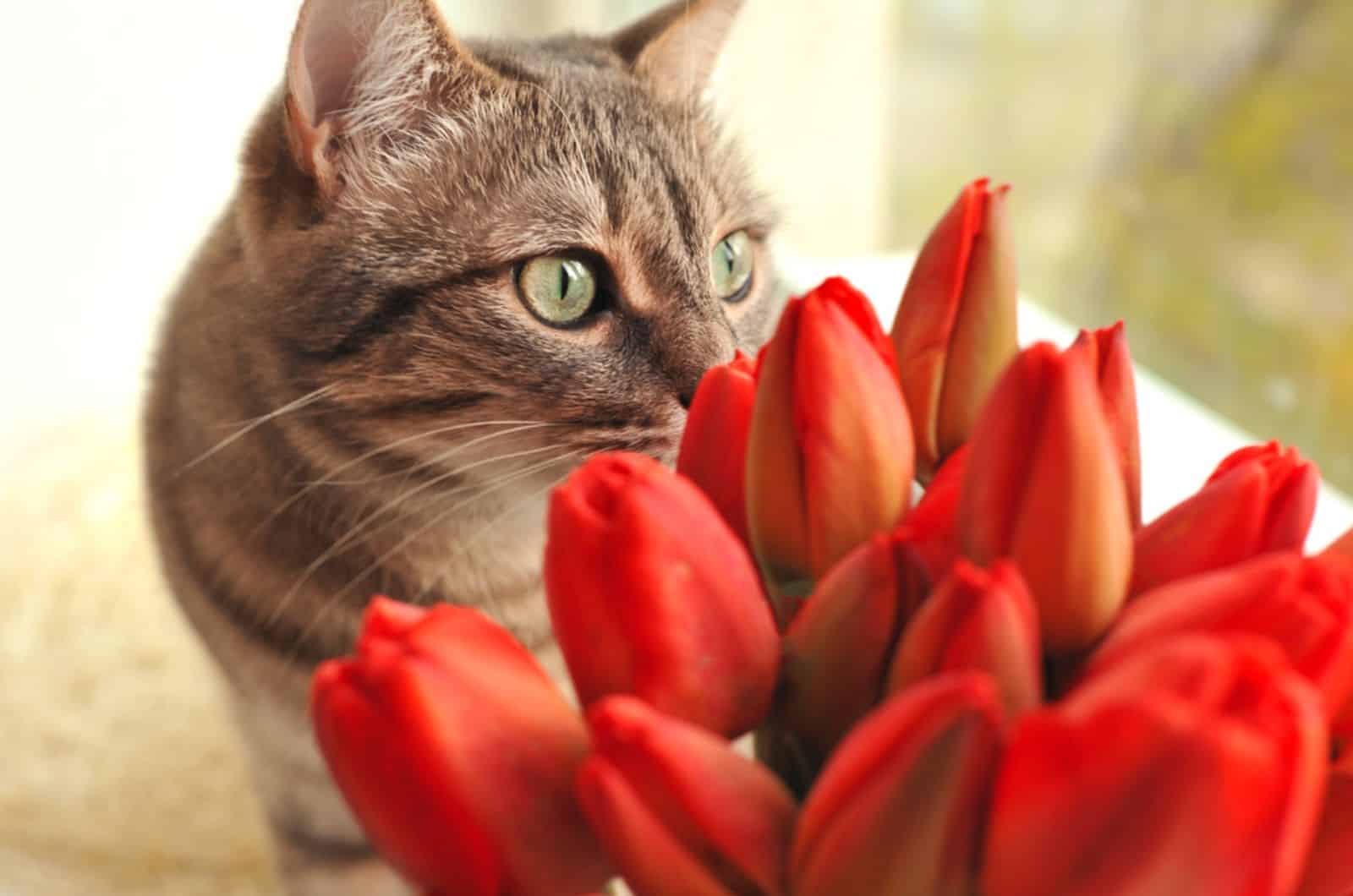
As you already know, not all flowers are safe for your cat to be around or ingest. Many plants that can cause your cat serious health issues are frequently found in gardens or bouquets.
Therefore, you need to be careful about which flowers your cat has access to, especially if you’re an owner of a very curious kitty that likes trying new things!
When it comes to a cat ingesting potentially poisonous plants, the symptoms vary depending on the type of flower and the amount ingested. The most common flower toxicity symptoms are:
• excessive drooling,
• loss of appetite,
• vomiting,
• diarrhea.
Some plants are toxic just by chewing them; consumption is not always necessary for a cat to become poisoned.
More toxic plants can cause life-threatening health issues, such as liver failure or kidney failure, irregular heartbeat, seizure, and even death.
The following flowers and plants are not cat-safe:
🐾 Tulips
🐾 Caladium
🐾 Carnation
🐾 Lily
🐾 Marijuana
🐾 Chrysanthemum
🐾 Amaryllis
🐾 Cyclamen
🐾 Daffodil
🐾 Daisy
🐾 Daylilies
🐾 Cape jasmine
🐾 Devil’s ivy
🐾 Daffodils
🐾 Easter lily
🐾 English Ivy
🐾 Hyacinth
🐾 Kalanchoe
🐾 Hydrangeas
🐾 Mum
🐾 Narcissus
🐾 Oleander
🐾 Peace lily
🐾 Poinsettia
🐾 Azalea
These are only a few of the plants that are harmful to cats. If you enjoy gardening or flowers, the ASPCA keeps a comprehensive list of safe and dangerous plants for cats.
It’s worth looking into, so I recommend every cat owner who is also a flower enthusiast to check it out to ensure they’re not exposing their cat to any potentially toxic flowers and plants.
Always research the flower or plant you’re bringing into your home to prevent serious health complications for your cat.
In Conclusion
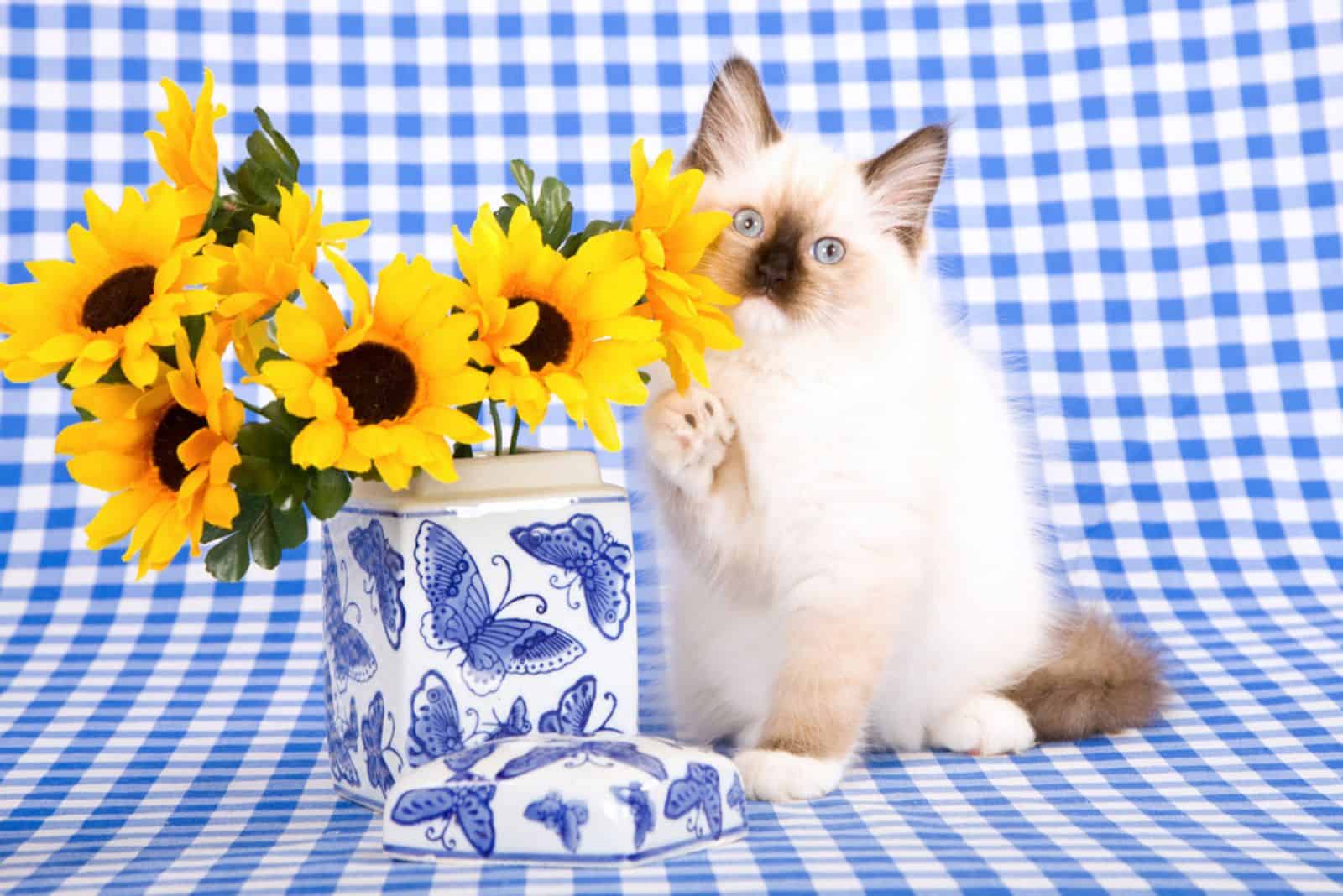
Are sunflowers toxic to cats?
Sunflowers are one of the most beautiful flowers and they are my favorites, so I’m very happy they’re safe for cats. If you have sunflowers in your garden or frequently displayed in your flower vase, I’m sure sunflowers being safe is good news for you (and your kitty)!
You don’t have to worry about sunflower seeds and oil, as they’re also non-toxic for your feline friend! However, they’re not an essential part of a cat’s diet; there is no need to incorporate them into your cat’s daily meals, although some cats enjoy sunflower seeds (with no shell) as an occasional treat!
Although sunflowers are non-toxic for cats, that does not mean eating a lot of them will not cause a tummy ache and perhaps diarrhea. Therefore, if you see your cat is munching on sunflowers more than it should, make sure to limit your cat’s access to these flowers.
Stay safe!
Related Articles:
Is Citronella Safe For Cats? Keeping Felines Safe And Sound

